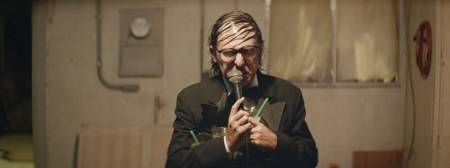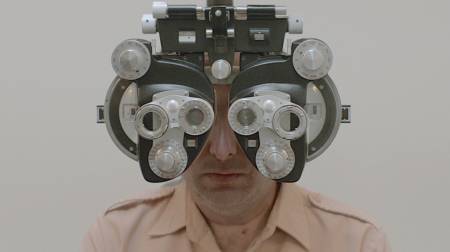-
Severin Fiala, Veronika Franz: GOODNIGHT MOMMY (20140
SEVERIN FIALA, VERONIKA FRANZ: GOODNIGHT MOMMY (2014)

SUSANNE WUEST IN GOODNIGHT MOMMY
Twins want their mommy
The Austrian film Goodnight Mommy is chilly, strange, and elegant. It's classy, even upper-class, horror. It all takes place at an expensive and original modern house somewhere out in the country (though not too far out to be visited by donation collectors from the Red Cross). It's also a film that's hauntingly ambiguous all the way through. Somebody is deluded, but who? We never really learn for sure. Perhaps it's not "so much weird as just plain disturbing," which was something that Mike D'Angelo, writing for The Dissolve from Toronto, said of the film. His report was how I first heard about this intriguing, if perhaps ultimately a little disappointing film. It's also in its final stages a nauseating film, one almost unbearable to watch, as may befit a product from the workshop, so to speak, of Ulrich Seidl, since Veronika Franz has repeatedly been his writing collaborator, and Seidl produced here.
In Goodnight Mommy there are two nine-year-old blond twin boys, Elias and Lukas (Elias and Lukas Schwarz) and their mother (Susanne Wuest). But is she their mother? She initially appears at the house, apparently after an operation, with her face bandaged like the masked heroine of Eyes Without a Face . To us, she is scary and strange. She's observed by Elias and Lukas fearfully, from a distance. At first she seems to avoid them, behaving furtively and insisting she requires rest and absolute quiet. To them she appears very strange, but also some of her behavior that we see but the boys don't is suspicious and may show her involved in deception. These mysteries are never resolved. When she begins interacting with Elias and Lukas more, she is mean to them, punishing them and restricting them, actually refusing ever to speak to Elias.
This is not the way they remember their mother behaving with them. They begin to doubt that she is their mother as she purports to be. The boys' own behavior begins to be increasingly bizarre, though always within a play world realm of little boys with the incestuous complicity of identical twins living in an isolated place. As D'Angelo puts it, "For a good long while, mere creepiness reigns." "But," he adds, "my screening saw multiple walkouts during the finale, which takes a sudden turn into prolonged torture. . ." This is as much perhaps as one should say about the direction the movie takes.
It's arguable that the Goodnight Mommy , while starting out extremely well, deteriorates from reel to reel. That nothing is ever quite as good thereafter as in its stylish, creepy, haunting opening shots. That it is less good but still original and fresh focused on the boys while the "mere creepiness" gathers. And that when the torture begins and the flashy ending comes, Fiala and Franz have moved into more conventional territory.
Still this is a horror film that is both classier and nastier than the majority of the genre, while for good and for ill avoiding most of the standard grabber devices of such films. It's not out of place to be reminded of Yorgos Lanthimos of Dogtooth: there's something conceptual and stylish going on here. (I now find Peter Debruge writing from Venice in Variety calls this "A fairy tale for Dogtooth enthusiasts." He also mentions Haneke's Funny Games.) I like the boys in bright homemade masks. I like their play with beetles. I like their frolicking -- and jumping on a big circular trampoline -- in a heavy rainstorm. I like the very stylish modern house, one so distinctive in design and decor and artwork that a series of photographs of its exterior and interiors can be found, as the boys do find them, on the internet. As the Toronto Festival blurb put it, "the family's home resembles a monumental tomb — a chillingly perfect setting for the film's story of familial disintegration."
The New Directors blurb reveals underlying themes when it starts out, "The dread of parental abandonment is trumped by the terror of menacing spawn." Now too much has been given away. But as in any good cinema, any narrative art, it is not the "what" but the "how," the style of the work, that makes it significant. This is quite a rich piece of work. Its content and subject matter mean Mommy will best appeal only to certain connoisseurs, but in the field of art house horror Fiala and Franz are clearly names to watch for in future.
Goodnight Mommy, 100 mins., debuted at Venice, showing at over a dozen other international festivals. Screened for this review as part of the March, 2015 edition of FSLC and MoMA's New Directors/New Films series. For theaters, it is slated to be a RADiUS-TWC release.

ELIAS AND LUKAS SCHWARZ IN GOODNIGHT MOMMY
Last edited by Chris Knipp; 03-20-2015 at 07:38 PM.
-
Oscar Ruiz Navia: LOS HONGOS (2014)
OSCAR RUIZ NAVIA: LOS HONGOS (2014)

CALVIN BUENAVENTURA TASCON AND JOVAN ALEXIS MARQUINEZ ANGUILO IN LOS HONGOS
Youth and street art in Cali, Colombia
Los Hongos is a film from Cali, Colombia directed by Oscar Ruiz Navia, his second feature, the first being the 2009 Crab Trap. The title ("The Mushrooms") refers to its two teen leads -- flourishing like mushrooms in the rubbish of urban mess (or something like that). It's a semi-documentary coming of age drama that is notable for containing a wealth of contemporary flavor from its protagonists' environment. Scenes include family life, graffiti artists at work and conferring on a project, a raucous punk music concert, and an attack on the two young leads by cops for tagging a wall, which leads to their being handcuffed and dropped way out in the country and forced to walk back. This journey inspires them to make new plans and to do a wall mural of a big tree they saw and climbed out in the country.
Ras (Jovan Alexis Marquinez Angulo) and Calvin (Calvin Buenaventura Tascon) are buddies from different races and social classes who have been drawn together by a mutual attraction to hip hop culture. Ras, who is black, and whose mother has been forced to immigrate from the countryside, is never without his skateboard, and is forced to steal paint from the building site where he works, which gets him fired. His buddy Calvin is white, a child of divorced parents, who spends time taking care of his former schoolteacher granny, who is recovering from cancer treatments. He and Ras visit his father to ask him for money. He's a singer, as we learn from a clip from an actual appearance on a TV show. Calvin, who is a student at the local college of art, but often misses class, has a would-be girlfriend, also an arts student. In one scene, they have sex, apparently for the first time, but when Ras connects with an older woman at the punk concert, it's she and Calvin's girlfriend who pair off this time, leaving Ras and Calvin with only their friendship, and their dedication to street art.
In an early scene of Los Hongos the boys watch an intense video they find online of state violence against demonstrators in Cairo during the Egyptian revolution. Based on the power of this scene and the solidarity they feel with the revolution, they want to do a wall painting to express their feelings, and think of doing one based on a scene of women in dark veils engaged in political demonstrations. Later at a meeting at art school of other graffiti artists, other plans come up.
Los Hongos shows how widespread hip hop culture is, the skateboarding, the gliders, the graffiti, the music mixing punk, ska, rap, and other elements, and the universal Facebook culture of left and revolutionary youth sentiment. Ruiz Navia does not try to go into much depth, and his film can't compare with the hipness and complexity of such Latin American youth films as Alexis Dos Santos's Glue or José Manuel (Che) Sandoval's Te creís la más linda pero es la mas puta, or on an even higher level of cinematic sophistication the films of Fernando Eimbcke and Gerardo Naranjo. But it looks directly at local society and youth culture in a documentary manner in ways they perhaps don't.
Los Hongos ("The Mushrooms"), 103 mins., debuted at Locarno 2014. Reviewed there by Jay Weissberg for Variety. Screened for this review as part of the March 2015 Film Society of Lincoln Center-Museum of Modern Art series New Directors/New Films. It is a Columbia-Argentina-France-Germany production.
Last edited by Chris Knipp; 03-13-2015 at 08:40 AM.
-
Rick Alverson: ENTERTAINMENT (2015)
Closing Night
RICK ALVERSON: ENTERTAINMENT (2015)

GREGG TURKINGTON IN ENTERTAINMENT
Long nasty road to despair, via unfunny humor
For those looking for a thoroughly unpleasant experience on film Rick Alverson's Entertainment is hard to beat. There are echoes of Fellini here (there's an energetic but slightly pathetic clown warmup act, played by Mud and Joe's up-and-comer Tye Sheridan), but the sad sweetness has all been replaced by mean nastiness. The film is conceived as a vehicle for Gregg Turkington or rather his two-bit washed-up performer alter ego, usually known as Neil Hamburger, whom he has reportedly played for several decades. The attempt, successful in sheer terms of screen-occupying, is to give this persona an off-stage, three-dimensional depiction.
The character is a mind-bogglingly terrible standup comic with an exceptional ability to bore and offend his small bar-club audiences and viciously and obscenely attack any members who visibly and audibly protest this assault on their sensibilities and waste of their time. He is shown touring around the Mohave desert and the empty oil-rich plains surrounding Bakersfield, California (Five Easy Pieces' setting, it's pointed out), staying in grim motels, riding in an old car, making futile nightly calls to the message machine of an estranged daughter, adding a note of pathos.
In a ritual that is shown more often than necessary, the pot-bellied, deadpan Turkington/Hamburger prepares for his "performances" by dressing in a ridiculous cheap tuxedo with outsize, outdated glasses. To enhance the unpleasant visual effect, he does an ugly comb-over that he emphasizes by making it dripping wet. He speaks to the audience in a high pitched whine, often interrupted by loud phlegm-enriched throat-clearing, and he repeats the word "Why?" gratingly. Most of his jokes are of the "What" and "Why" form, such as "Why don’t rapists eat at T.G.I. Friday’s?" and "What’s the difference between Courtney Love and the American flag?" The answers are too vulgar and offensive to repeat.
Trouble is, the chronological spaces between performances aren't always coherent, and the action is repetitious. The effect is of nails endlessly scraping across a blackboard. Cameos by John C. Riley (as the comic's supportive, but reserved cousin), Michael Cera (as a random stranger) detract from the mood rather than furthering it. The same can be said of a lecture on color theory, and a torturous moment at an optician's office (though it does provide a memorable image; Alverson may be a bit too enamored of anything that's odd and shocks).
Thus it turns out that Alverson doesn't quite wind up having the skill to build Turkington's stage schtick into the desired three-dimensional off-stage character, but as offensive, unbearable-to-watch movies go, this is up there. This will have cult appeal for hipsters in search of so-bad-it's-hilarious humor. Others need to give it a wide birth.
Perhaps the audiences are real. Doubtless the first one, in a prison, is so, and, interestingly, it is the most amused at the flat, intentionally terrible jokes of "The Comedian," as he is solely known here.
In a typically detailed review Scott Founas of Variety helps set Alverson's film in context, pointing out "The Comedian "suggests a cross between Andy Kaufman’s desiccated lounge singer Tony Clifton and Mr. Sophistication, the desperate vaudeville MC memorably played by Meade Roberts in John Cassavetes’ The Killing of a Chinese Bookie." Foundas notes besides the Cassavetes reference the film also "nods in the direction of both Two-Lane Blacktop and Paris, Texas (complete with Dean Stockwell cameo)," partly becoming a road movie.
Along the way there are far too many scenes in public restrooms. One involves a confrontation with Michael Cera as a pathetic (and not very convincing) hustler. The scene one most would prefer to forget is a horrific childbirth scene Foundas compares to Eraserhead's that may not really be happening (one certainly hopes not). By this point, the editing has become increasingly surreal, with scenes often hovering uneasily between dream, waking nightmare, and possible flashback. The road eventually leads toward Los Angeles and home, where The Comedian has a special gig for the birthday party of "a well-known celebrity." Here his existential despair leads, under pressure, to a final moment of total emotional meltdown.
Whether Alverson is one to watch or one to avoid, he clearly represents a bold and distinctive personality in the US indie film world, albeit not quite a fully formed one. As the Guardian's Jordan Hoffman writes of his feelings about Entertainment, "I’m still not sure if I should be laughing, crying, yawning or walking out of the cinema. Neither, perhaps, are the film-makers." That's not the way it needs to be.
Entertainment, 110 mins., debuted at Sundance 2015. Also reviewed by John DeFore for Hollywood Reporter. It was screened for this review as part of the March 2015 New Directors/New Films series, where it was the closing night film.

GREGG TURKINGTON IN ENTERTAINMENT
Last edited by Chris Knipp; 03-17-2015 at 01:15 PM.
-
Surveying the series

SURVEYING THE SERIES.
Again New Directors/New Films lives up to its name with solid offerings. And perhaps in the view of some more edgy, provocative material than before. That is, if the dog torture in White God; wicked mute youths in The Tribe; vile standup comic and Lynchian childbirth of Entertainment; chopped up immigrants of Haemoo;, 15-year-old having sex with mom's adult boyfriend in Diary of a Teenage Girl; tortured mother in the Austrian Goodnight Mommy may be so viewed. These are much talked about, not so successful as films, except that actually Fiala and Franz's Goodnight Mommy is some of the most elegant filmmaking in the series.
Debates over provocation aside, clearly outstanding films of the series are: Yury Bykov's intense, involving Russian working class-bureaucratic corruption drama The Fool (a good companion piece to Zvyagintsev's Leviathan); Chaitanya Tamhane's astonishingly richly observed judicial malpractice Indian film Court; Nadav Lapid's confusing but assured and forceful film treatment of going nuts over poetry, The Kindergarten Teacher; the Ross brothers' solid, saddening documentary study of Tex-Mex border violence Western. Despite trawling personal tapes Stevan Riley's Showtime documentary of Brando Listen to Me Marlon isn't very innovative but it is extremely informative. French director Sarah Leonor's The Great Man is a touching Claire-Denis-esque study of estrangement and fatherhood. New names to remember: Byokov, Tamhane, Leonor; Bill and Turner Ross; Fiala and Franz.
Those are more conventional successes. But it wouldn't be New Directors without more innovative or fringe discoveries like the off-kilter Québecois slacker girl picture Tu dors Nicole; the depressed yet visually stunning Paranoid Park-knockoff Violet; the cheerful French gay romp Fort Buchanan ; the Mongolian Kafka remake K; studies of Christmas-tree selling in Brooklyn and living homeless with dogs in the pampas; several others, which, though none of them really huge successes, all add just a bit to our range of the cinematically possible. Onward!
(Sorry not to have seen more of Film Comment Selects but High Society doesn't totally disappoint, while Petzold's Phoenix is superb, a strong affirmation of the German director's enormous talent. Note: we were able to view all of the New Directors films except Naji Abu Nowar's Theeb.)


Last edited by Chris Knipp; 03-20-2015 at 01:30 PM.
 Posting Permissions
Posting Permissions
- You may not post new threads
- You may not post replies
- You may not post attachments
- You may not edit your posts
-
Forum Rules






 Reply With Quote
Reply With Quote






Bookmarks